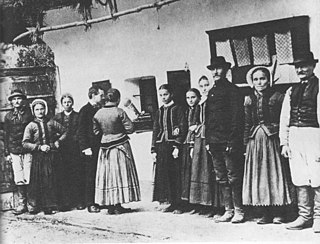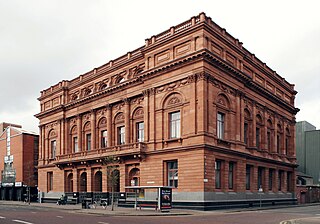
Folk music is a music genre that includes traditional folk music and the contemporary genre that evolved from the former during the 20th-century folk revival. Some types of folk music may be called world music. Traditional folk music has been defined in several ways: as music transmitted orally, music with unknown composers, music that is played on traditional instruments, music about cultural or national identity, music that changes between generations, music associated with a people's folklore, or music performed by custom over a long period of time. It has been contrasted with commercial and classical styles. The term originated in the 19th century, but folk music extends beyond that.

A composer is a person who writes music. The term is especially used to indicate composers of Western classical music, or those who are composers by occupation. Many composers are, or were, also skilled performers of music.
Brian Irvine is a composer from Northern Ireland. His work has been characterized as avant-garde, incorporating elements of "free jazz, rock, rap, thrash, tango, lounge and contemporary classical" music. Irvine was Associate Composer with the Ulster Orchestra (2007–2011) and Professor of Creative Arts at the University of Ulster.

Irish music is music that has been created in various genres on the island of Ireland.
The state of Maine is located in the New England region of the northeastern United States. Its musical traditions extend back thousands of years to the music of the first peoples of Maine, the Penobscot Passamaquoddy, Wabanaki and other related Indigenous cultures.

The Ormeau Baths in Belfast, Northern Ireland, now a home to tech and digital businesses in a modern contemporary building, was one of Ireland's premier contemporary art spaces. It curated exhibitions by prominent international artists including; Yoko Ono, Gilbert & George, Victor Sloan, Bill Viola, Hans Peter Kuhn, Stan Douglas, David Byrne, Willie Doherty and Alastair MacLennan.

Belfast Central Library is a public library in Royal Avenue, Belfast, Northern Ireland. Opened in 1888, it was one of the first major public library buildings in Ireland.
Féile an Phobail, also known as the West Belfast Festival is a community arts organisation known for its August Féile (Festival). The organisation is prominent for its promotion of Irish and international culture. The festival takes place on and around Falls Road in Belfast, Northern Ireland.

The Ulster Orchestra is based in Belfast, the only full-time professional orchestra in Northern Ireland. The orchestra plays the majority of its concerts in Belfast's Ulster Hall and Waterfront Hall. It gives concerts across Northern Ireland and the Republic of Ireland, including performances at the Belfast Festival, the Wexford Opera Festival, the Kilkenny Arts Festival, and the National Concert Hall, Dublin. The orchestra currently employs 63 full-time musicians and 17 administrative support staff.

Liu Fang(Chinese: t劉芳,s刘芳,pLiú Fāng;b. 1974) is a Chinese–Canadian musician who is one of the most prominent pipa players in the world. Described in the media as the "empress of pipa" (L'actualité), "divine mediator" (World), "the greatest ambassadress of the art of the pipa", Liu Fang is known as "possessing virtuoso technique, grace and a unique empathy toward the music she plays – whether it is a traditional and folk tune or a modern Western composition". "She has an extraordinary focused, poised presence in her manner and her playing. In a lesser player this is just a trained formality; the body of material and techniques for her instruments is extremely highly developed, passed down through centuries. But Liu Fang’s total devotion to her playing has moved her beyond perfect execution to the creativity and flexibility that marks a true musician."(in the fRoots Magazine, 06.2006).

Hormoz Farhat was a Persian-American composer and ethnomusicologist who spent much of his career in Dublin, Ireland. An emeritus professor of music, he was a fellow of Trinity College, Dublin. Described by the Irish Times as a "a gifted and distinctive composer of contemporary classical music," his compositions include orchestral, concertante, piano and choral music, as well string quartets and chamber works. He also wrote numerous film scores, including that of Dariush Mehrjui's 1969 film The Cow. However, his musicological research dominates his legacy; his writings on the music of Iran—a country which he insisted be called 'Persia'—were pivotal in ethnomusicology, particularly his acclaimed 1990 study The Dastgah Concept in Persian Music.
The culture of Belfast, much like the city, is a microcosm of the culture of Northern Ireland. Hilary McGrady, chief executive of Imagine Belfast, claimed that "Belfast has begun a social, economic and cultural transformation that has the potential to reverberate across Europe." Belfast is split between two rarely-overlapping vibrant cultural communities, a high-culture of opera, professional theatre, filmmaking and the visual arts and a more popular or commercial culture. Throughout the short years of troubles, Belfast tried to express itself through art and music.
British Library Sounds is a British Library service providing free online access to a diverse range of spoken word, music and environmental sounds from the British Library Sound Archive. Anyone with web access can use the service to search, browse and listen to 50,000 digitised recordings. Playback and download of an additional 22,000 recordings is available to Athens or Shibboleth users in UK higher and further education. The service was originally launched with funding by the Jisc.
Justinian Tamusuza is a Ugandan composer of contemporary classical music.
Geoff Harden was a journalist, broadcaster, recording engineer and folk music promoter. Born in Kent, England, Harden moved to Belfast, Northern Ireland in 1966. He became well known on the music scene in Belfast after setting up the Sunflower Folk Club in Corporation Street, and consequently for his work as a folk music columnist in The News Letter and as a presenter on and contributor to numerous local radio stations.

Joan Denise Moriarty was an Irish ballet dancer, choreographer, teacher of ballet and traditional Irish dancer and musician. She was a key figure in the development of both amateur and professional ballet in Ireland.

David Flynn is an Irish composer and musician with a number of major awards and commissions to his name. He is the founder and artistic director of the Irish Memory Orchestra. Many of his works music merge the influence of traditional Irish music with contemporary classical music and jazz. He is also a multi-instrumentalist who works across many genres including classical, jazz, rock and traditional Irish music, with guitar being his main instrument.

Tommy Sands is a Northern Irish folk singer, songwriter, radio broadcaster, and political activist. He performs with his three siblings as The Sands Family; solo as Tommy Sands; and with his son and daughter as Tommy Sands with Moya and Fionán Sands. Tommy was the prime songwriter for The Sands Family, one of Ireland's most influential folk groups of the 1960s and '70s.
Philip Hammond is an Irish composer. He has also been a teacher, writer and broadcaster.
'Unlocking Our Sound Heritage' (UOSH) is a UK-wide project that aims to preserve, digitise and provide public access to a large part of the nation's sound heritage. The UOSH project forms part of the core programme 'Save Our Sounds' led by the British Library and involving a consortium of ten regional and national archival institutions. Between 2017 and 2022 the aim is to digitise and make available up to 500,000 rare and unique sounds recordings, not only from the British Library's collection but from across the UK, dating from the birth of recorded sound in the 1880s to the present time. The recordings include sounds such as local dialects and accents, oral histories, previously inaccessible musical performances and plays, and rare wildlife sounds. The consortium will also deliver various public engagement programmes, and a website where up to 100,000 recordings will be freely available to everyone for research, enjoyment and inspiration.













